Everyone is probably familiar with Poker, Slots, and Bingo. But what about Mahjong, Fight the landlord, and fish shooting games? What if I told you that those games make up the casino scene in the biggest mobile market in the world?
At GameRefinery, we have covered the Western casino space on a couple of different occasions already, so it only makes sense to shed some light on the situation in China too. Spoiler alert: it’s vastly different.
What does the Chinese Casino Market look like?
Let’s start the analysis by taking a high-level look at the Chinese casino market. How does it stack up to the other game categories and genres? What are the biggest casino games in China?
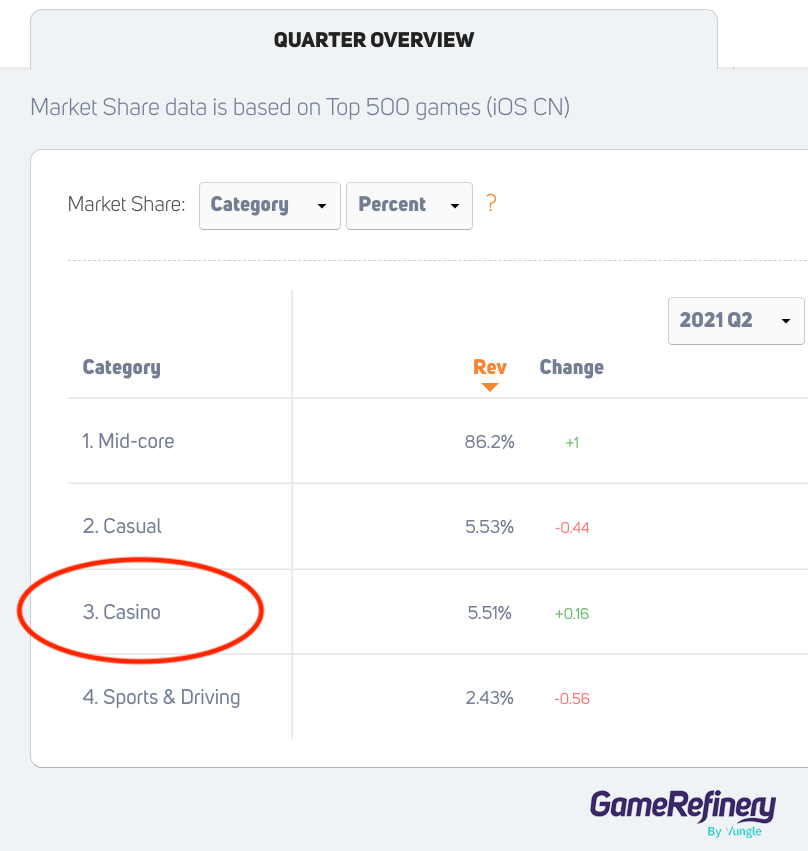
Unsurprisingly, mid-core is the dominating category in the Chinese top-grossing market. However, casino is practically as big as casual in China.
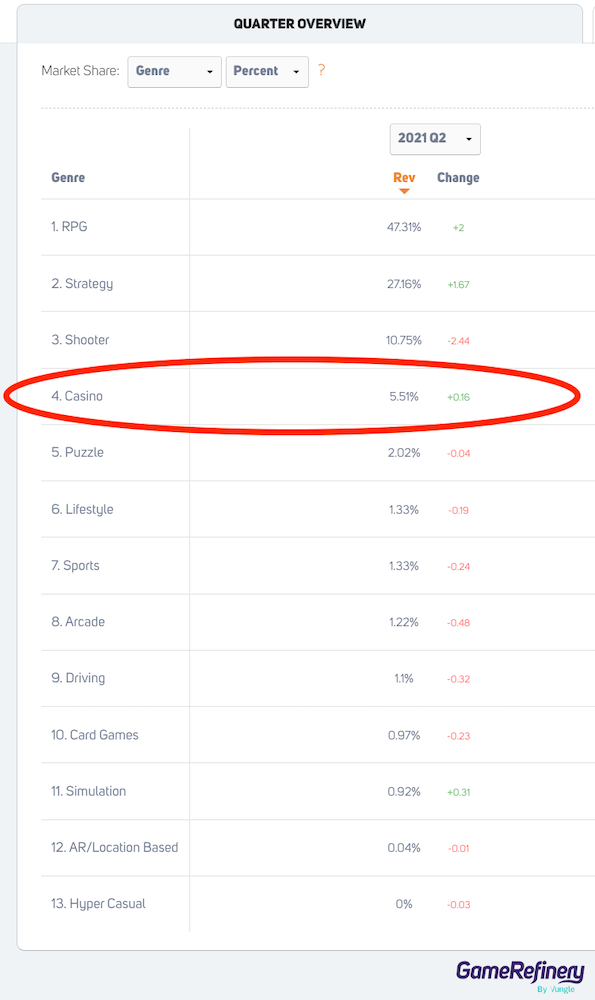
On genre level, we can see that casino is the biggest non-mid-core genre in the market – e.g., 2.5 times bigger than puzzle.
The 5.5% revenue market share translates into 40-50 games in the top 500 grossing. In other words, around 8-10% of games in CN’s top 500 grossing are casino games. So what are those games?

The top dog in this space is Tencent’s Landlord Poker, which, despite its name, is not a poker game but instead all about fight the landlord (a popular Chinese card game).
JJ Doudizhu – essentially a collection of different types of casino and casual games (e.g., fish shooting, mahjong, fight the landlord) – is second. The only game in this list that isn’t about the fish shooting, fight the landlord, or mahjong is Sohoo Poker at number 10.
Out of these exotic Chinese casino game types, fish shooting is arguably the most interesting one. Roughly speaking, fish shooting constitutes about one-third of the casino market in China.
So what the Heck are Fish Shooting Games?
The history of fish shooting games can be traced down to arcade halls in places such as Hong Kong and Singapore. From there, they have spread around the pacific rim and to Asian-oriented communities around the world, e.g., in California. In the West, there has been no shortage of discussion on the games’ gambling elements and even connections to organized crime.
The core idea behind fish shooting games is relatively simple. A group of players (usually four players) shoot fish with cannons for rewards. The cannons are placed on different sides of the gameboard, and everyone shoots the same pool of fish. A key decision for players is to decide which fish to shoot. This is because the fish vary in terms of rarity, “health,” and speed – meaning it is much easier to kill a small fish for fewer rewards than a large fish for bigger rewards. Fish also float in and out of the board, so it is important to keep track of whether the fish has just entered the board or is about to slip out.
How much, really, does player skill affect the gameplay outcome is obviously something we all have only limited visibility into, but at least there exists a veil of illusion for that.
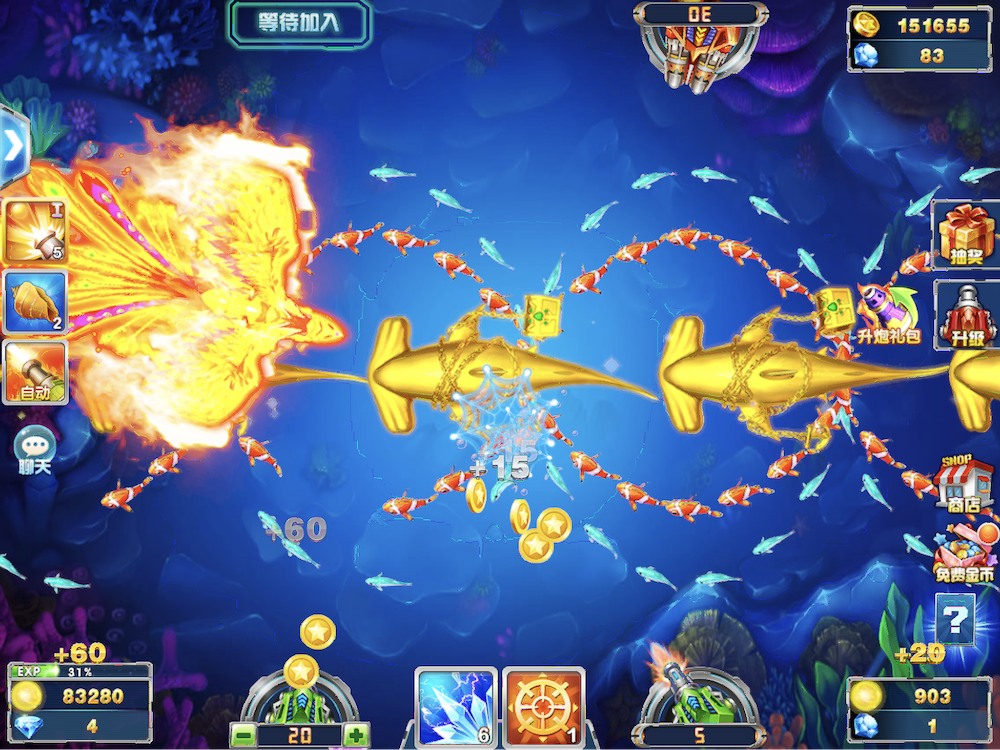
The main currency in these games also serves as ammunition for the cannons. In other words, you consume currency when shooting the fish – and if you don’t manage to kill your fish, all the bullets/currency you’ve pumped (or should we say “invested”) into the fish is lost. The player who shoots the very last bullet needed to kill a particular fish gets all the rewards.
Players also have control over the effectiveness of the bullets. What does this mean? Let’s say that by default, you fire at 1 (shot): 1 (bullet) rate. I.e., firing one shot consumes one bullet. However, this is often not enough to kill any of the larger fish. Thus players often increase the rate, e.g., to 1:5, 1:20, or 1:50. At 1:50, the stakes are naturally higher – think of, e.g., a situation where you have fired a long burst at 1:50 rate, and the fish manages to escape…
The casino elements are numerous, including:
- Players can choose different “tables” with different entry requirements
- The main currency is the lifeline for players to keep on playing. Without currency, your cannon stays kaput.
- Players can exit and enter a “table” at will without interrupting the gameplay of other players
Fish Shooting Games’ Features
Let’s take a brief look into some of the key features of fish shooting games in terms of monetization, social elements, and retention.
At the heart of these games’ monetization is the hybridization of a currency and gameplay energy, familiar to other casino games, such as poker. In other words, you use the main currency to make certain purchases in the game, but players also need it to access the gameplay and pick themselves up if they run out of bullets. The core gameplay is also typically monetized with several boosters, such as a “kill all the fish on the board.”
Meta monetization usually focuses on cosmetics, such as cannon skins & wings and player avatar frames, but we have also seen power progression elements: in some games, different cannons have different stats.
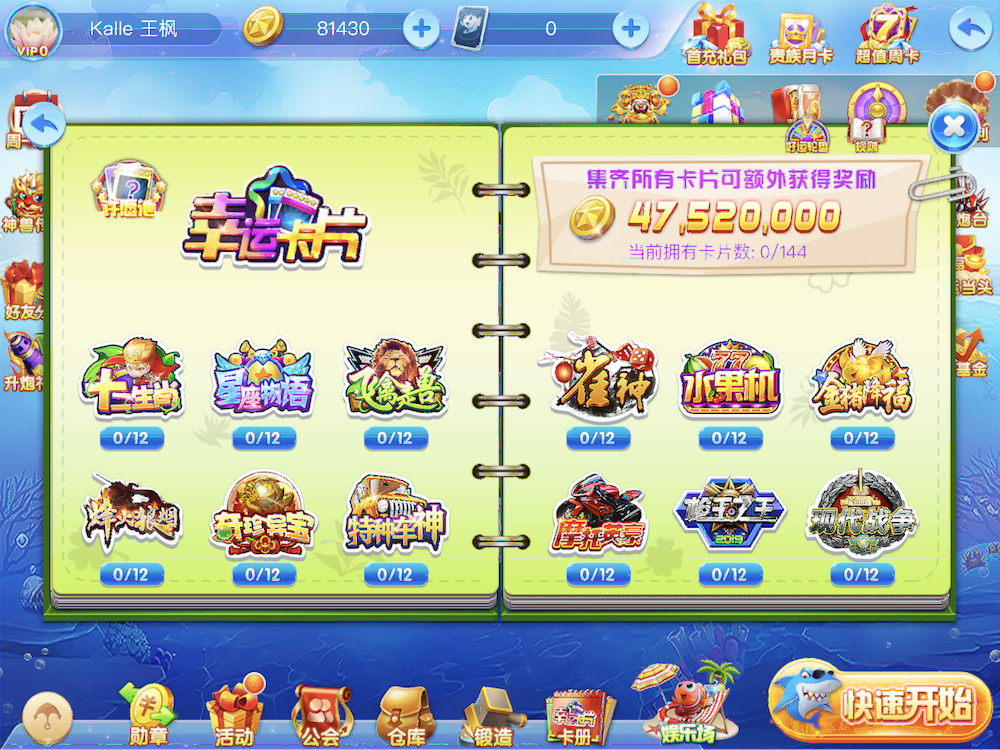

Currency, cosmetics, and boosters often form the foundation for the monetized content. The tools to monetize the content vary from subscriptions to VIP systems, gacha wheels to limited-time promotions, and even rentable items.

Social & Events
While competitive elements such as leaderboards and PVP-modes exist, fish games usually share more motivational ground with slots than poker. Hence, fish games are primarily single-player experiences. However, it is not uncommon to see social features, such as guilds, in fishing games too.
In terms of events, the general picture is the same as with any other genre in Chinese top grossing. Events are plentiful, and they come in many different shapes. Events can be, e.g., seasonal, gacha-based, server-wide, and they might have, e.g., login calendars, IAP-progression elements, event currencies & shops.
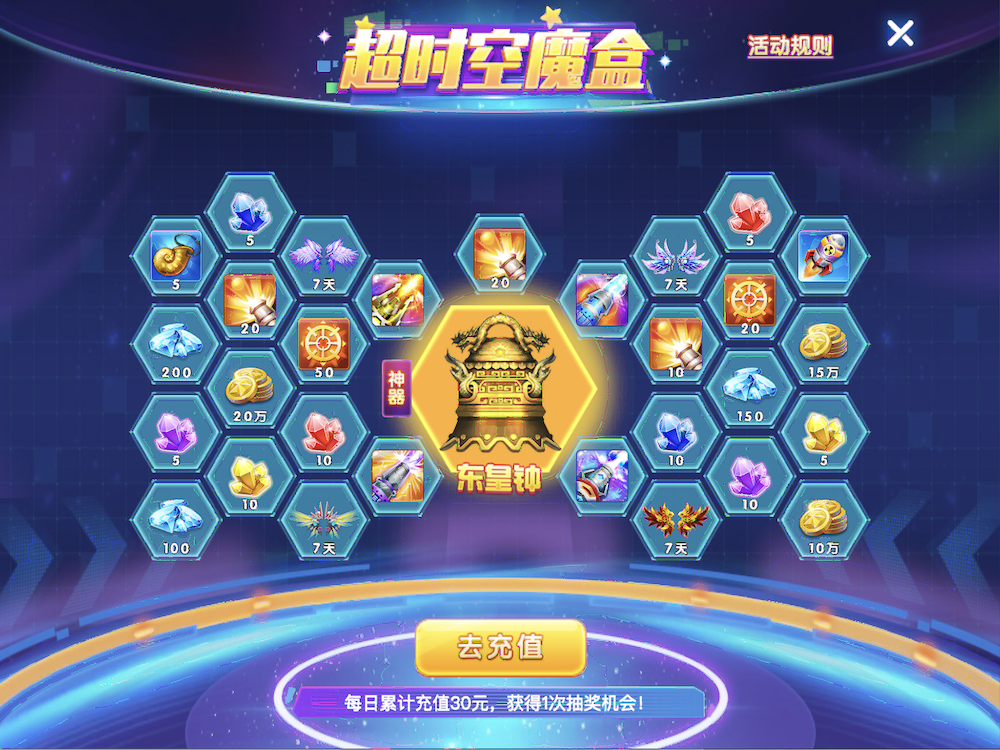
Conclusion
We hope it’s become evident by now that the casino space in China is vastly different from the West. If you want to discuss how we can help you understand the mobile market better, please make sure to reach out to us.
If you enjoyed reading this post, here are a few more you should definitely check out:





















